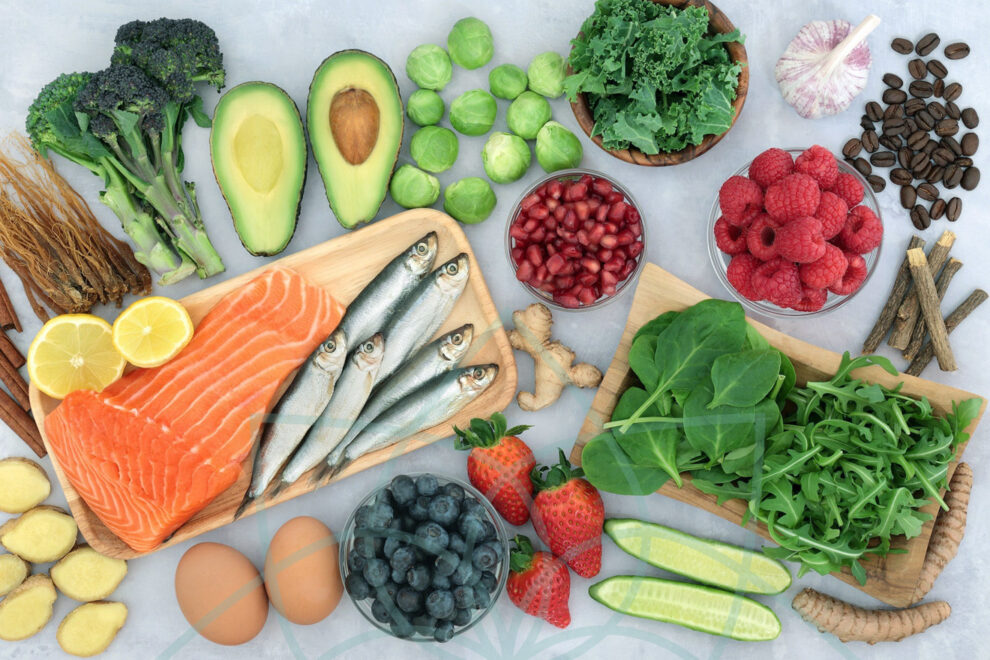Welcome to the golden years! As women gracefully step into their 60s, it becomes increasingly important to prioritize health and well-being. One key aspect that deserves attention is inflammation. Inflammation can affect various parts of the body and is often associated with aging. In this blog post, we’ll explore why reducing inflammation is crucial for women over 60 and provide some light yet effective steps to achieve a healthier, more vibrant life.
Why Inflammation Matters: Inflammation is the body’s natural response to injury or infection. However, chronic inflammation can lead to various health issues, including heart disease, arthritis, and even cognitive decline. As women age, the risk of inflammation-related conditions tends to increase. That’s why taking proactive steps to reducing inflammation becomes essential for maintaining optimal health in the golden years.
The Power of an Anti-Inflammatory Diet
In the journey to combat inflammation, adopting an anti-inflammatory diet emerges as a potent ally. This dietary approach not only nurtures your body but also plays a crucial role in reducing inflammation naturally.
Colorful Fruits and Vegetables: Picture your plate as a vibrant canvas filled with an array of colorful fruits and vegetables. These plant-based foods are rich in antioxidants, which are the body’s defense against free radicals – molecules that can trigger inflammation. Berries, leafy greens, tomatoes, and bell peppers are not only delicious but also packed with vitamins and minerals that promote overall health.
Omega-3 Fatty Acids: Omega-3 fatty acids, found in fatty fish like salmon, mackerel, and sardines, as well as in flaxseeds and walnuts, are renowned for their anti-inflammatory properties. These healthy fats play a crucial role in balancing the body’s inflammatory response, helping to curb chronic inflammation. Consider incorporating these omega-3-rich foods into your diet to support joint health and reduce the risk of inflammatory conditions.
Hydration for Detoxification: Amidst the colorful bounty and healthy fats, don’t overlook the importance of staying hydrated. Water is not just a thirst quencher – it acts as a natural detoxifier, flushing out toxins from the body. Proper hydration supports the kidneys in eliminating waste and maintaining a healthy balance within the body. Make it a habit to drink an adequate amount of water throughout the day to amplify the benefits of your anti-inflammatory diet.
Reducing Inflammation: Stay Active, Stay Healthy
Regular physical activity isn’t just a recommendation; it’s a game-changer when it comes to actively reducing inflammation and promoting overall well-being. Engaging in a routine of low-impact exercises offers a multitude of benefits, especially for women over 60 who are navigating their golden years.
Low-Impact Exercises for Joint Health: Embrace the joy of movement through low-impact exercises that are gentle on the joints yet highly effective. Activities such as walking, swimming, and yoga provide an excellent way to keep joints flexible and improve mobility. These exercises promote synovial fluid circulation, enhancing joint lubrication and reducing the risk of stiffness. Not only do they contribute to joint health, but they also foster a sense of vitality and energy.
Endorphins and Anti-Inflammatory Effects: The magic of exercise lies not just in its physical impact but also in its ability to uplift your mood and combat inflammation. When you engage in physical activity, your body releases endorphins – those feel-good neurotransmitters that act as natural painkillers and mood enhancers. Beyond the immediate mood boost, endorphins have anti-inflammatory effects on the body, helping to mitigate chronic inflammation over time.
Mind-Body Connection through Yoga: Consider incorporating yoga into your routine as a holistic approach to both physical and mental well-being. Yoga not only enhances flexibility and balance but also encourages mindful breathing and stress reduction. The mind-body connection established through yoga contributes to a more relaxed state, which, in turn, can positively influence inflammatory responses in the body.
Prioritize Quality Sleep
Establishing a relaxing bedtime routine can significantly enhance the quality of your sleep. Engage in activities that promote relaxation, such as reading a book, practicing gentle stretches, or enjoying a warm cup of caffeine-free herbal tea. These calming rituals signal to your body that it’s time to unwind, paving the way for a restful night’s sleep.
Optimizing the Sleep Environment: Transform your bedroom into a haven for quality sleep by keeping it cool, dark, and quiet. Consider investing in blackout curtains to block out external light, and maintain a comfortable room temperature conducive to sleep. These environmental factors contribute to better sleep quality and aid in the reduction of inflammation.
Digital Detox Before Sleep: In the age of screens, limiting screen time before sleep is crucial for a restful night. The blue light emitted by electronic devices can interfere with the production of the sleep hormone melatonin. This disrupts your circadian rhythm. Create a technology-free zone at least an hour before bedtime to allow your body to naturally wind down and prepare for a rejuvenating sleep.
Prioritizing quality sleep is a strategic approach to actively reducing inflammation. By dedicating time to sleep hygiene practices, establishing a relaxing bedtime routine, optimizing the sleep environment, and embracing a digital detox, you empower your body to navigate the night seamlessly. As you sink into the restorative embrace of sleep, you’re not just resting. You are you’re actively participating in the body’s anti-inflammatory mechanisms, paving the way for a healthier and more vibrant you. Sweet dreams await on the path to inflammation reduction and overall well-being. For that smooth transition into a restful, but not drugged, sleep, take a zlem snap before bedtime.
Minimizing Stress in Reducing Inflammation
In the intricate dance between lifestyle and inflammation, managing stress effectively emerges as a crucial player. Chronic stress can significantly contribute to inflammation, making it imperative to adopt strategies that promote mental and emotional well-being. By cultivating a mindful approach to stress management, women over 60 can actively participate in the reduction of inflammation and embrace a more serene and vibrant life.
Mindfulness Practices: Incorporating mindfulness practices into your daily routine can be transformative in managing stress. Meditation, with its focus on breath and present-moment awareness, has been shown to reduce stress hormones and promote a sense of calm. Engage in guided meditation sessions or explore mindfulness apps that cater to various preferences and experience levels. The simplicity of mindfulness techniques makes them accessible and effective tools for stress reduction.
The Healing Power of Deep Breathing: Deep breathing exercises, such as diaphragmatic breathing or pranayama, offer a direct and accessible way to manage stress. The act of slowing down your breath activates the body’s relaxation response, calming the nervous system and lowering stress levels. Furthermore, dedicate a few minutes each day to intentional, deep breathing exercises to cultivate a sense of tranquility amid life’s demands.
Nature as a Stress Reliever: Connecting with nature is a powerful antidote to stress. Spending time outdoors has been linked to reduced stress levels. Try a leisurely walk in the park, gardening, or simply sitting in a natural setting. The sights and sounds of nature create a soothing environment that can help alleviate the tension accumulated from daily stressors. Embrace the therapeutic benefits of nature to foster a sense of balance and harmony.
Spice Up Your Life – Literally!
In the culinary realm, the inclusion of certain spices transcends their role as mere flavor enhancers. They become potent allies in the fight against inflammation. Turmeric and ginger, renowned for their powerful anti-inflammatory properties, offer not only a burst of flavor but also a natural boost to your body’s defenses against inflammation. Let’s explore how these kitchen superheroes can elevate both the taste and health quotient of your meals.
Turmeric – The Golden Wonder: Turmeric, with its vibrant golden hue, contains curcumin, a compound celebrated for its potent anti-inflammatory and antioxidant effects. Incorporating turmeric into your cooking adds a warm, earthy flavor and a touch of color to dishes. From curries and soups to roasted vegetables, finding creative ways to introduce turmeric into your recipes can elevate the nutritional profile of your meals. In addition, consider making a golden turmeric latte or adding a pinch to your morning smoothie for a delightful twist.
Ginger – Zest for Life: Ginger has a zesty and aromatic profile. It is another spice that packs a punch in the anti-inflammatory department. It contains gingerol, a bioactive compound known for its anti-inflammatory and antioxidant properties. Fresh or ground, ginger can be incorporated into a myriad of dishes, including stir-fries, teas, and desserts. Adding ginger to your cooking not only tantalizes your taste buds but also provides a natural remedy to support your body in its quest to combat inflammation.
Pairing for Synergy: What makes turmeric and ginger even more powerful is their synergistic effect when paired together. The combination of these spices not only creates a harmonious flavor profile but also enhances their respective anti-inflammatory properties. Consider adding a pinch of turmeric and a dash of freshly grated ginger to dishes like soups, stews, or marinades to amplify both taste and health benefits.
As women enter the wonderful phase of life beyond 60, taking proactive steps to reducing inflammation becomes a key ingredient for a healthy and vibrant future. Embrace an anti-inflammatory diet, stay active, prioritize quality sleep, manage stress effectively, and don’t forget to spice up your life. Your body will thank you for these small yet impactful changes. Thus, ensuring that the golden years truly shine with health and happiness. Another “snap” for improved gut health is called “byom”. It is available for daily use.
References:
Cleveland Clinic Inflammation
WebMD, Reduce Inflammation As You Age
Harvard Health, Foods to Reduce Inflammation



